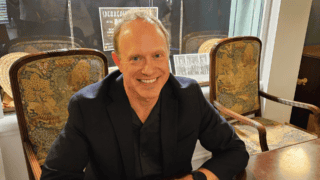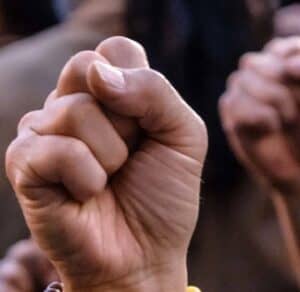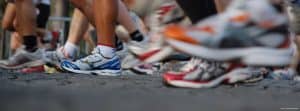The Lavin Agency Speakers Bureau
A speakers bureau that represents the best original thinkers,
writers, and doers for speaking engagements.
A speakers bureau that represents the best original thinkers,
writers, and doers for speaking engagements.
Your struggle is your motivation in disguise.
Waneek Horn-Miller has always lived for what she believes. From fighting for Indigenous rights to her iconic cover in TIME magazine as the first Mohawk woman to compete in the Olympics, she’s persevered through it all with resilience and strength. After a near-fatal stabbing by a Canadian soldier during the Oka Crisis, she almost gave up her dreams in sports. But for Waneek, “being someone’s victim was not an option.” Ten years to the day of the stabbing, she led her team into the Olympics as co-captain. She took control of her story—and now inspires others to do the same. An incredible storyteller, Waneek shares her hopeful insight on reconciliation, community, mental health, and social harmony to spark a drive in every listener. “You want to know about resilience and strength and never giving up? You just ask Indigenous people. We are tough. I wanted to show the world that. And I think I did at the Olympics.”
“You have to figure out what it is that’s the trigger for your motivation and recruit people into helping you, and, as well, get tough with yourself. Look in the mirror and say, I’ve had it with all the excuses. I want to make my dreams my reality, and I want to start today.”— Waneek Horn-Miller
Throughout her life, Waneek Horn-Miller has always stood up for what was right—as a mother, an activist, an athlete, and an entrepreneur. This has entailed hard choices, pain, and sacrifice. But this commitment has also made her one of Canada’s most inspiring figures. Previously, she assumed the role of Director of Community Engagement for the National Inquiry into Missing and Murdered Indigenous Women and Girls. By connecting the commission to victims’ families, as well as the public, she provided a recognizable and trusted face to an incredibly important initiative: one that seeks justice, raises awareness of violence against Indigenous women, and furthers the dual tasks of healing and reconciliation.
Horn-Miller’s public life began in 1990 at the age of 14. During the Oka Crisis, she protested the planned development of condos and a golf course on traditional Kanien’kehá:ka (Mohawk) lands and burial grounds near Montreal. After nearly 80 days of stand-off with the RCMP and armed forces, she was stabbed in the chest by a Canadian soldier wielding a bayonet. The image of her wounded, holding her young sister, was shared across national media—and further galvanized Canadians to better understand, and care about, Indigenous issues.
This near-death experience marked a turning point in her life. Instead of succumbing to very real traumas, including PTSD, she found the strength to pursue, and achieve, incredible things. “I come from people who have gone through horrific things in history,” she says. “War, death, famine, genocide. How many times did my ancestors want to give up, lay down, and die? But they didn’t. They fought to continue. You have to keep going forward.”
“I encourage all Canadian youth to look beyond colour and borders and work as a team to solve issues together.”— Waneek Horn-Miller
One of Horn-Miller’s greatest achievements has been in athletics. She was the first woman to be named Carleton University’s Athlete of the Year, which she won four years in a row. After winning gold with her water polo team at the Pan Am Games in 1999, and after winning MVP of the Canadian Senior Women’s Water Polo National Championships, she became the first Mohawk woman from this country to ever compete in the Olympic games, co-captaining Team Canada in Sydney in 2000. That same year, she appeared on the cover of TIME magazine. This became another iconic image—one of dignity, poise, and power, as opposed to pain and fear—as well as a milestone for Indigenous athletes. She went on to win bronze at the 2001 FINA World Championships and became a torchbearer for the Winter Olympics in Turin. She has been named one of Canada’s most influential women in sport by the Canadian Association for the Advancement of Women and Sport and Physical Activity. In October 2019, she was inducted into Canada’s Sports Hall of Fame, making her the first water polo player ever to be honored.
After her retirement as an athlete, she has gone on to help others achieve in sports and lead healthy, balanced lifestyles. She was Assistant Chef de Mission for Team Canada at the 2015 Pan Am Games. She is also the host of Working It Out Together—a 13-part documentary and healthy-eating initiative with the Aboriginal Peoples’ Television Network, which aims to build “an Indigenous movement of positive change” and “features dynamic leaders in health advocacy and courageous men and women who are figuring out what it takes to be well and to thrive.” Her work here was recognized with a 2015 DAREarts Cultural Award. She was one of CBC’s Primetime Panelists during the 2024 Olympic Games.
She is also an ambassador for Manitobah Mukluks, the world-famous footwear brand. Known for being Indigenous-owned and proudly Canadian, Manitobah Mukluks supports Indigenous communities, shares success with others, keeps traditions alive, and celebrates living history—a compelling blend of fashion, quality product, and social responsibility.
Today was one of the most inspiring moments in my last years. Waneek was amazing! She was able to engage us all, to really reflect on our behaviors. Her storytelling is worth admiring.
Coca-ColaWaneek and her story, presence, authenticity, charm, storytelling, compassion, and perspective were THE highlight of the event for our 2000 participants. She was an absolute rockstar and was such a joy to have with us on such an important occasion. Thank you so much for making her participation possible. She is just wonderful.
TD Bank GroupOur attendees said things like “goosebumps," “honest," “genuine,” “amazing talk," "so inspiring." All incredible—I have heard her speak before and I could listen to her again and again. Miigwetch for an incredible experience. We truly appreciate the gift of hearing Waneek’s talk!
University of TorontoWaneek was absolutely fantastic. She was engaged as we met to touch on what the panel would be about. She was generous with her time during the VIP session. And on the stage, she was incredible. She told meaningful and concise stories, she bantered with her fellow panelists, and she brought the room to silence when she had something specific to share.
Classroom ChampionsNothing but excellent feedback from us. Waneek was super awesome to deal with and her presentation brought many to tears—always a good sign for a day-closing speaker. Thank you so much for connecting Waneek to us!
Community Futures Grande Prairie and RegionThe keynote event we had with Waneek was absolutely amazing and all of our staff and community members were just amazed by her. That session will no doubt be the highlight of the Culture Camp event this year.
First Light – St. John’s Native Friendship CentreWaneek was amazing! We were absolutely thrilled. She is such an inspiring, down to earth person—we heard nothing but fantastic things from across the community. I think I could listen to her speak all night, she was fantastic on the panel as well.
Brescia University CollegeEverything was fantastic! We heard nothing but great feedback regarding Waneek and her time with us. Waneek was able to shift the energy from the first half of the event to leave everyone with that hopeful, good feeling to end the day on.
Southern Alberta Institute of TechnologyWaneek was fantastic! She was one of our top rated keynote speakers ever. Her talk was timely, relevant and inspiring. She was also very generous with her time and stayed to speak to audience members following her talk. We really appreciated her talk.
Physiotherapy AlbertaI have to say we were beyond thrilled with Waneek. She was everything we expected and more. We had a small group of 100 people but there was not a single person who wasn’t completely focused on her story and the journey she spoke about. I would recommend Waneek to anyone who is thinking about booking her; she was fantastic.
Algoma Family Services FoundationWaneek’s presentation at our conference was timely, relevant and inspiring. Her messages that “reconciliation is an action” and that we are all humans first, combined with her personal story of perseverance in the face of adversity served to challenge and inspire our audience. Her genuine interest in others, warm spirit, and clear commitment to advancing the cause of reconciliation were evident to all who had the opportunity to hear her speak. Countless attendees approached the event organizers over the balance of the event and in the days and weeks following to comment on how much they enjoyed Waneek’s presentation.
Physiotherapy Alberta - College + AssociationWaneek was an absolute hit with our students (and staff and faculty!). She hit all the right notes for us, connected her core message with our theme in a beautiful way that was exactly what we wanted to convey to our students. I firmly believe she’s paved the way for many students to feel more comfortable learning more about and engaging in discussion around Aboriginal issues. One student thanked our committee, saying that meeting Waneek was the highlight of her life so far. I feel so very lucky to have spent time with her and I know everyone else who got the opportunity feels the same way.
University of British ColumbiaWaneek’s words were inspiring, honest, and heartfelt. I truly appreciate the actionable advice she gave to us as an organization and us as individuals.
Choice PropertiesWaneek’s talk was humbling, inspiring, and empowering all at the same time. Her energy was felt all throughout the room and listening to her life’s journey taught us about respect, perseverance, and accomplishment. What an honor to have had the privilege to meet and listen to her.
Building Officials Association of BCCEO of Trend Hunter New York Times bestselling author of Create the Future
Host of The Rick Mercer Report for 15 years Bestselling Author of Talking to Canadians and Rick Mercer Final Report Winner of the Stephen Leacock Medal for Humour
One of the world's top public intellectuals Author of Rationality, Enlightenment Now, and When Everyone Knows That Everyone Knows . . . Harvard Professor

Harvard Economist MacArthur Genius Studying Economic Opportunity Director of Opportunity Insights

Historian New York Times Bestselling Author of Humankind: A Hopeful History, Utopia for Realists, and Moral Ambition

Author of Morningside and THE AMERICANO

Host and Creator of Challenge Accepted, the YouTube Series with 5 Million Followers TIME100 Honoree

Harvard Business School Behavioral Science Professor "40 Under 40 MBA Professor" Author of TALK: The Science of Conversation and the Art of Being Ourselves

Speaker on Stress and Leadership in the Workplace Columbia Business School Professor Host, TED Business Podcast Expert, Limitless with Chris Hemsworth

Author of Grit, the #1 New York Times Bestseller | Pioneering Researcher on Grit, Perseverance, and the Science of Success

2024 Nobel Prize Winner | 3rd Most Cited Economist in the World | Bestselling Co-Author of Why Nations Fail and Power and Progress

Harvard Business School Behavioral Science Professor | "40 Under 40 MBA Professor" | Author of TALK: The Science of Conversation and the Art of Being Ourselves

#1 New York Times Bestselling Co-Author of Abundance | Host of thePlain English Podcast | Founder of the Substack Derek Thompson

#1 New York Times Bestselling Author of How the Word Is Passed and Above Ground | The Atlantic Staff Writer

While working for the National Inquiry into Missing and Murdered Indigenous Women and Girls, Waneek Horn-Miller knew process was just as important as results. The inquiry sought to expose the underlying causes of violence in this country—and make recommendations to eliminate them—in a timely, organized fashion. But this had to be balanced with the emotional needs of participants—their deep need to be heard, validated, and humanized. In other words, it needed to grant victims, and their families, the opportunity to heal.
In this keynote, Horn-Miller unpacks the hard but necessary work ahead of us if we want to escape our history of conflict and move to a place of shared understanding. If we embrace the true spirit of reconciliation, we need to make it a way of life—a cornerstone of how we proceed as a multicultural society—and not just a destination. To Horn-Miller, this takes listening, and dialogue; it means extending empathy to those with different outlooks, and not shying away from debate; it means solutions-based thinking rooted in our shared aspirations. But if we can do this, we can do something unique in this country. And we can embrace what reconciliation is all about—a way of addressing wrongs, living in harmony, and healing for those who need it most.

The greatest lesson Waneek Horn-Miller ever learned was that “anything is possible.” Suffering from post-traumatic stress syndrome after being stabbed, at the age of fourteen, she could have recoiled from life. Instead, she embraced it like never before. On stage, she traces the powerful journey she took from beleaguered youth to star Olympic athlete to one of the most articulate and vibrant voices in Canada today. A model of perseverance, good-natured humour, and soulful wisdom, Horn-Miller inspires audiences to follow their own dreams, fight for their heritage, and achieve their full potential in the face of seemingly insurmountable odds. “Motivation is the biggest thing and the key to your success,” she says. “You have to figure out what it is that’s the trigger for your motivation and recruit people into helping you, and, as well, get tough with yourself. Look in the mirror and say, I’ve had it with all the excuses. I want to make my dreams my reality, and I want to start today.”

As the host of Working it Out Together—a documentary series that follows eight Indigenous people on a journey to reclaim their vitality through health, wellness, and fitness—Waneek Horn-Miller is dedicated to helping others find balance. In this talk, she addresses nearly every issue related to wellness: from food scarcity and boil-water alerts in our First Nations, Métis, and Inuit communities to the rampant physical and mental health problems Indigenous people face every day, including obesity, eating disorders, low self-esteem, substance abuse, lack of motivation, and more—including depression and suicide. A former Olympic athlete who has been living a high-performance lifestyle since childhood, she takes her audiences on a voyage of self-discovery, determination, sacrifice, and social change that can transform our lives (and country) for the better and prove anything is possible.